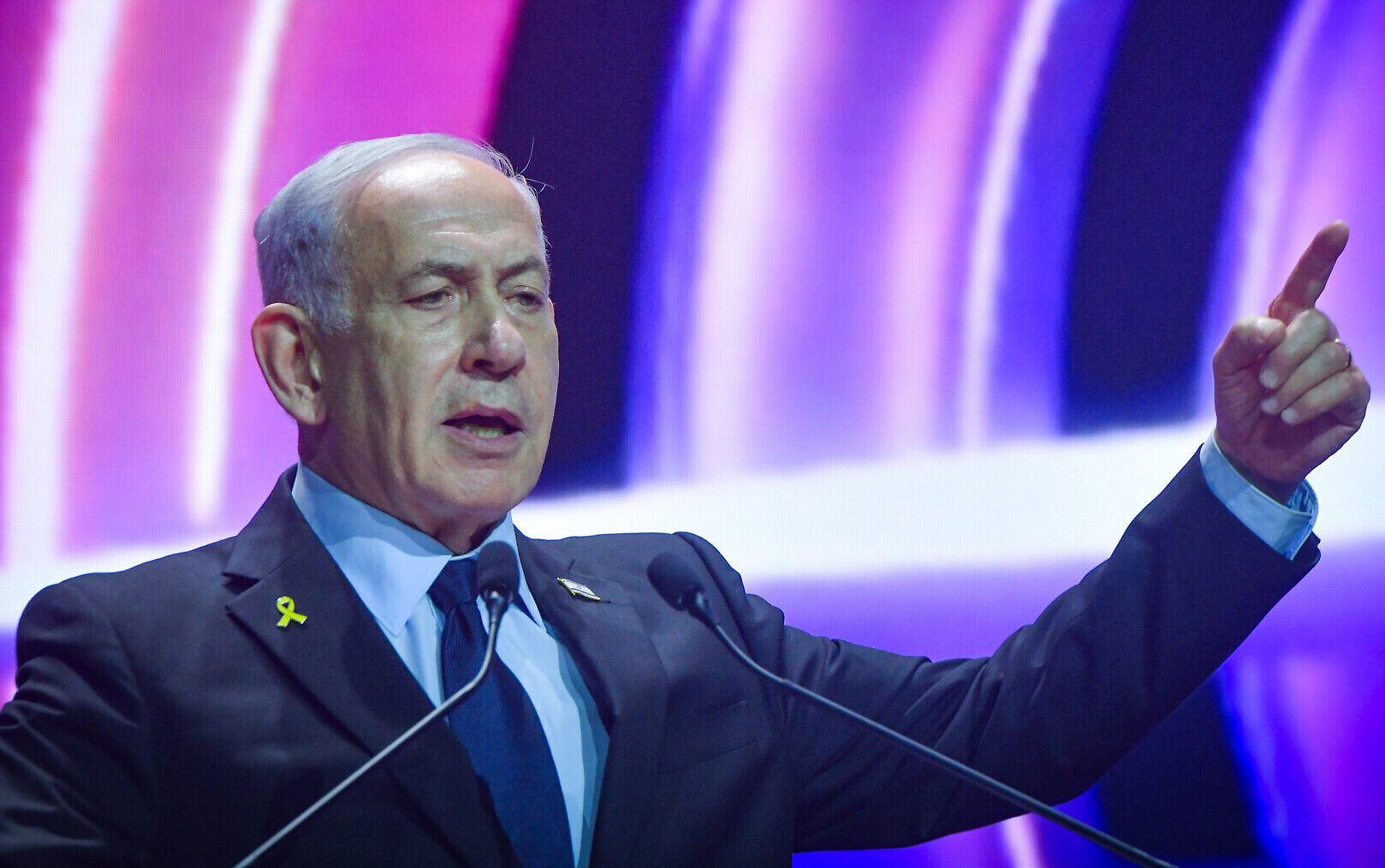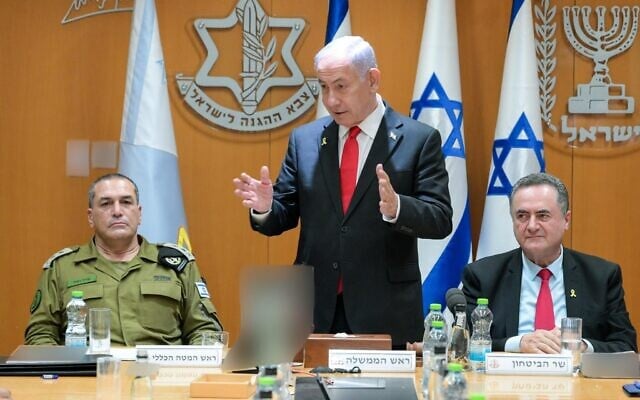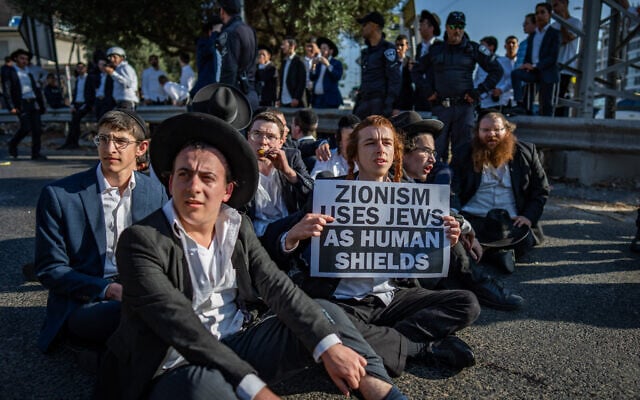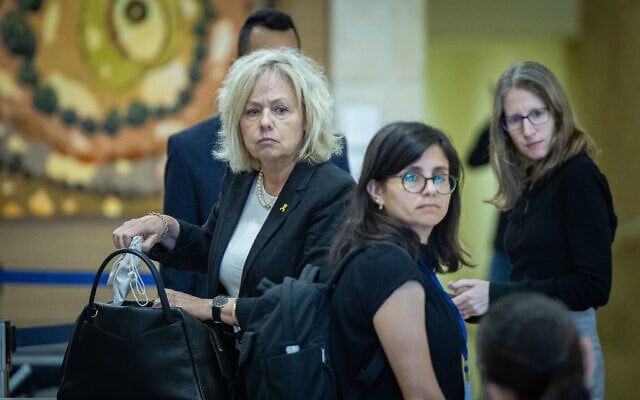



This Editor’s Note was sent out earlier Wednesday in ToI’s weekly update email to members of the Times of Israel Community. To receive these Editor’s Notes as they’re released, join the ToI Community here.
What is Prime Minister Benjamin Netanyahu’s endgame for the war against Hamas in Gaza?
His declared goals, repeated ad infinitum, are to destroy Hamas’s military power and its capacity to rule, enable the return of all 50 remaining hostages, and ensure that Gaza can no longer constitute a threat to Israel.
In practice, this currently sees the IDF extending its hold over Gaza — where it is now close to controlling 75% of the Strip, the portion it was ordered in May to fully secure. It holds a two-kilometer buffer zone around the perimeter of Gaza, in which almost every building has been destroyed. It has taken full control of Rafah, the southern city where the population had grown to about a million in May 2024 as Gazans fled southward. Today, Rafah is empty of civilians and uninhabitable — as the IDF moves to cleanse it of Hamas infrastructure and gunmen. And almost every day, the IDF carries out airstrikes targeting Hamas commanders.
Almost every day, too, numerous Gaza noncombatants are killed in those airstrikes and, in often disputed circumstances, at or close to aid distribution hubs. Twenty Palestinians were killed on Wednesday morning at the Gaza Humanitarian Foundation’s site in Khan Younis, most of them trampled to death, in an incident the GHF blamed on armed agitators linked to Hamas. A large family was reportedly buried under a building hit by an IDF airstrike on Monday in Gaza City, in circumstances that the IDF has yet to address. Six children were reportedly killed in an IDF strike on Sunday at a water distribution point in central Gaza — an incident for which the IDF blamed a “technical malfunction” as it targeted an operative from the Palestinian Islamic Jihad terror group. Eight children were among 13 reportedly killed in a strike last Thursday that the IDF said targeted a Hamas terrorist who took part in the October 7, 2023, massacre in southern Israel.
Defense Minister Israel Katz would have the IDF next establish a “humanitarian city” on the ruins of Rafah, where 600,000 Gazans would be screened and housed — permitted to enter but not to leave, other than to depart the Strip — in what former prime minister Ehud Olmert has warned would be a concentration camp. The idea is apparently to relocate to this city the Gazans who are currently living in the al-Mawasi area on the coast of southern Gaza, designated by Israel as a “humanitarian zone,” so that the IDF can enter Mawasi and clear it of Hamas infrastructure.
IDF Chief of Staff Eyal Zamir is widely reported to oppose the entire “humanitarian city” idea — questioning how it advances Netanyahu’s declared goals for the war and regarding it as potentially heralding a long-term military administration of Gaza, a task with which the IDF has not been charged by its political masters and which he would want to avoid.
More broadly, Zamir is widely reported to be wondering, along with most everybody else, what constitutes the prime minister’s specific end-of-war vision, and what the IDF is supposed to be doing in order to achieve it. Netanyahu has, since late May, included Trump’s February vision for a Gaza emptied of Gazans as a condition for ending the war. His far-right coalition partners Bezalel Smotrich and Itamar Ben Gvir, bent on permanently occupying and settling the Strip, will accept nothing less.
But Trump himself is markedly cooler on the idea than he is about the urgency of ending the conflict. And while Netanyahu asserted at the White House last week that Israel and the US were “getting close to finding several countries” to take in those who would like to leave, no country has to date stepped forward with a declared willingness to absorb vast numbers of Gazans.
Netanyahu is publicly adamant that Hamas can and will be definitively defeated — that it will, if not surrender, be compelled to accept terms that ensure its demise. Some in the military top brass share the assessment. Others are not so sure.
Iran agreed to a ceasefire after 12 days in which Israel battered its nuclear program, ballistic missile capabilities, key commanders and symbols of the regime. Hezbollah surrendered after most of its leadership was eliminated and thousands of its operatives incapacitated in September’s staggering exploding beeper operation. Both had more to lose in continuing to fight.
The question is whether Hamas, almost all of its leaders eliminated, its battalions largely destroyed, sees things in a similar light. Or whether, by contrast, it remains bent on hurting Israel any way it can — killing soldiers wherever possible in the Strip, firing whatever missiles and shells it can manage at Israel. All this while seeing Israel hemorrhage support as the world watches the near-daily scenes of civilian death, and insistently holding those 50 hostages, 20 still alive, as the leverage for its intended survival and revival.
Even as the IDF was giving the families of three soldiers killed in Gaza the terrible news of their loved ones’ deaths on Monday evening, Netanyahu was holding emergency negotiations to try to prevent the two ultra-Orthodox parties from bolting his coalition — trying, that is, to accommodate their unconscionable demand for the continued broad exemption of ultra-Orthodox young men from IDF service. This at a time when the standing army and reservists are under unprecedented strain, with new challenges now on the Syrian border too, and the IDF is crying out for recruits.
The prime minister, as so often and so effectively in the past, is playing for time — aiming to reach the end of this Knesset session on July 27 with his coalition intact, or if not intact, at least without an immediate threat of being plunged into early elections.
Netanyahu will have to face the electorate again sometime soon, and no later than October 2026. But he intends to do so on his own terms — with as much distance as possible between him and the failure to thwart the October 7 slaughter by Hamas, with as much blame as possible placed upon the security establishment and as little as possible on him. He wants the hostages home and no ongoing attacks from Gaza. He wants to set out his agenda for Gaza “the day after,” and for the West Bank too, for that matter, in order to maximize electoral support — moving just a touch toward the center or staying firmly on the right, as his assessment of the public mood requires.
Since the exemption of the ultra-Orthodox from military service is so deeply unpopular even among his own base, Netanyahu will also want to find a formula that avoids alienating his direct supporters but also keeps the Haredi parties in his camp — to square the circle on his terms, when he wants to do so, and, notably, without having to battle the High Court over the matter. Hence his coalition’s ongoing determination to push through legislation designed to politicize and constrict the judiciary.
In short, come election day, Netanyahu wants to have centered as much governing power as possible in his own hands: Having prevailed in his legal battle to oust Shin Bet chief Ronen Bar and enable the imminent appointment of his preferred successor, Maj. Gen. David Zini, he is also far along the road to sacking Attorney General Gali Baharav-Miara, after which he can move to install an attorney general handpicked to arrange a plea bargain in his trial that would not require him to leave public office.
His ministers this week decided to back a bill that would allow any new government, in the first 100 days after taking office, to simply dismiss, should it so choose, almost every key independent official — from the the attorney general to the IDF chief of staff, head of the Shin Bet, head of the Mossad, police commissioner, head of the Israel Prison Service, Civil Service commissioner, and head of the budget department in the Finance Ministry.
Combined with a neutered judiciary, this bill — which will become law as and when the prime minister chooses — would complete Israel’s transition from democracy to autocracy and give the prime minister undisputed authority.



